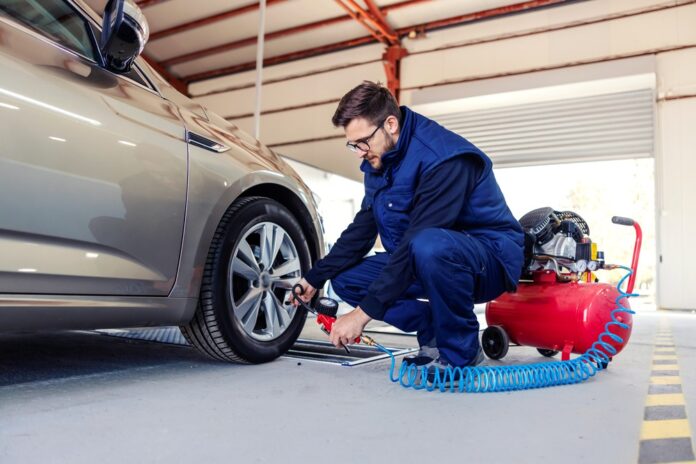Air compressors are invaluable tools in various industries and home workshops, providing the power needed for countless tasks. However, when an air compressor isn’t installed properly, it can lead to a cascade of problems, ranging from diminished performance to costly repairs and even safety hazards. Recognizing the signs of a botched installation is key to addressing these issues promptly and ensuring your air compressor operates safely and efficiently. If you suspect your installation was subpar, it’s wise to look into “air compressor repair near me” to find qualified professionals who can diagnose and rectify the problem.
The Importance of Proper Air Compressor Installation
Before diving into the warning signs, let’s emphasize why proper installation is paramount. An air compressor is a complex system with various components working together to generate and deliver compressed air. When installed correctly, these components function harmoniously, ensuring optimal performance, energy efficiency, and longevity. Conversely, a botched installation can disrupt this delicate balance, leading to many problems that compromise the compressor’s effectiveness and lifespan.
Common Red Flags
Excessive Noise and Vibration
One of the most noticeable signs of a poorly installed air compressor is excessive noise and vibration. If your compressor sounds like a jet engine or shakes violently during operation, it’s a clear indication that something is amiss. This could be due to improper mounting, loose connections, or inadequate vibration isolation. Ignoring these signs can not only be a nuisance but also lead to premature wear and tear on the compressor’s components.
Frequent Tripping of Circuit Breakers
If your air compressor consistently trips the circuit breaker, it’s a strong indication of an electrical issue. This could be caused by using the wrong wire gauge, improper grounding, or overloading the circuit. Electrical problems can be dangerous and should be addressed immediately by a qualified electrician.
Moisture in the Air Lines
Moisture contamination is a common problem in air compressor systems, and it can stem from incorrect installation of air dryers or moisture separators. Excessive moisture can lead to rust and corrosion in air tools and equipment, as well as affect the quality of the finished product in certain applications. Inspecting the air lines for signs of moisture and ensuring the proper functioning of air treatment components is essential.
Low Air Pressure or Inconsistent Output
If your air compressor struggles to maintain the desired pressure or delivers inconsistent airflow, it could be due to leaks in the system, a malfunctioning pressure switch, or inadequate pipe sizing. These issues can significantly hamper productivity and lead to frustration, especially in industrial settings where reliable air pressure is crucial.
Overheating
An air compressor that overheats is not only inefficient but also at risk of damage. Overheating can be caused by inadequate ventilation, clogged air filters, or a malfunctioning cooling system. If you notice your compressor running excessively hot, it’s crucial to investigate the cause and take corrective action to prevent costly repairs.
How to Fix Installation Issues
If you’ve identified signs of a botched installation, don’t despair. There are several steps you can take to address the issues and restore your air compressor’s optimal performance. Here’s a breakdown of some common fixes:
- Consult the Manual: Always refer to the manufacturer’s installation manual for specific guidelines and recommendations. This document provides valuable information on proper mounting, piping, electrical connections, and maintenance procedures.
- Check for Leaks: Inspect all connections, hoses, and fittings for leaks. Even small leaks can significantly impact air pressure and efficiency. Use soapy water to identify leaks and tighten or replace any faulty components.
- Verify Electrical Connections: Ensure that the electrical connections are secure and that the correct wire gauge is used. If you’re unsure, consult an electrician to verify the wiring and grounding.
- Inspect Air Treatment Components: Check that the air dryer or moisture separator is functioning correctly and that the air filter is clean. Replace any worn-out or damaged components.
- Consider Professional Help: If you’re not comfortable troubleshooting and fixing the issues yourself, don’t hesitate to seek professional assistance. A qualified air compressor technician can diagnose the problems accurately and provide effective solutions. Searching for “air compressor installation near me” or “air compressor repair near me” can help you find local experts.
Preventing Installation Problems
The most effective way to sidestep the frustrations and expenses associated with a poorly installed air compressor is to prioritize getting it right from the very beginning. This involves a multi-pronged approach, starting with careful selection of the right compressor for your specific needs and intended application. A compressor that is too small will struggle to meet demand, while one that is too large will waste energy and money.
Once you’ve chosen the appropriate compressor, meticulous adherence to the manufacturer’s installation guidelines is paramount. These instructions are not mere suggestions; they are carefully crafted to ensure optimal performance, safety, and longevity of your equipment. Cutting corners or taking shortcuts during installation can lead to a lot of problems down the line.
Investing in high-quality components, such as piping, fittings, and electrical connections, is another crucial aspect of a successful installation. Inferior components are more prone to leaks, corrosion, and other issues that can compromise the compressor’s efficiency and lifespan.
If you lack the experience or confidence to tackle the installation yourself, seek the expertise of a qualified professional. While professional installation may incur an upfront cost, it can save you significant money by preventing costly repairs and ensuring that your air compressor operates at peak efficiency from day one.
Conclusion
Proper air compressor installation is not just a matter of convenience; it’s essential for safety, efficiency, and longevity. By being aware of the warning signs of a botched installation and taking proactive steps to address any issues, you can ensure that your air compressor operates at its best, saving you time, money, and frustration in the long run. Remember, when in doubt, don’t hesitate to consult with air compressor repair Chicago services to get your system back on track. Investing in a professional air compressor installation is an investment in your peace of mind and the longevity of your equipment, ensuring it remains a valuable asset for years of reliable service.
Find a Home-Based Business to Start-Up >>> Hundreds of Business Listings.















































